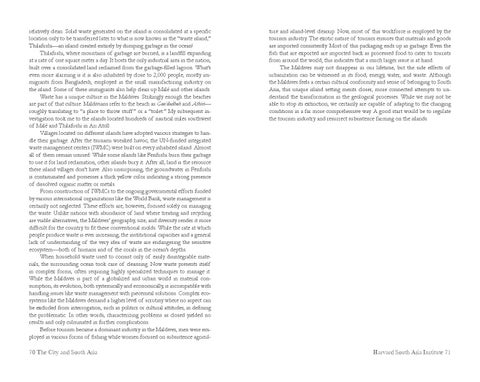relatively clean. Solid waste generated on the island is consolidated at a specific location only to be transferred later to what is now known as the “waste island,” Thilafushi—an island created entirely by dumping garbage in the ocean! Thilafushi, where mountains of garbage are burned, is a landfill expanding at a rate of one square meter a day. It hosts the only industrial area in the nation, built over a consolidated land reclaimed from the garbage-filled lagoon. What’s even more alarming is it is also inhabited by close to 2,000 people, mostly immigrants from Bangladesh, employed in the small manufacturing industry on the island. Some of these immigrants also help clean up Malé and other islands. Waste has a unique culture in the Maldives. Strikingly enough the beaches are part of that culture. Maldivians refer to the beach as Gon’dudhoh and Athiri— roughly translating to “a place to throw stuff ” or a “toilet.” My subsequent investigation took me to the islands located hundreds of nautical miles southwest of Malé and Thilafushi in Ari Atoll. Villages located on different islands have adopted various strategies to handle their garbage. After the tsunami wreaked havoc, the UN-funded integrated waste management centers (IWMC) were built on every inhabited island. Almost all of them remain unused. While some islands like Fenfushi burn their garbage to use it for land reclamation, other islands bury it. After all, land is the resource these island villages don’t have. Also unsurprising, the groundwater in Fenfushi is contaminated and possesses a thick yellow color indicating a strong presence of dissolved organic matter or metals. From construction of IWMCs to the ongoing governmental efforts funded by various international organizations like the World Bank, waste management is certainly not neglected. These efforts are, however, focused solely on managing the waste. Unlike nations with abundance of land where treating and recycling are viable alternatives, the Maldives’ geography, size, and diversity render it more difficult for the country to fit these conventional molds. While the rate at which people produce waste is ever increasing, the institutional capacities and a general lack of understanding of the very idea of waste are endangering the sensitive ecosystem—both of humans and of the corals in the ocean’s depths. When household waste used to consist only of easily disintegrable materials, the surrounding ocean took care of cleansing. Now waste presents itself in complex forms, often requiring highly specialized techniques to manage it. While the Maldives is part of a globalized and urban world in material consumption, its evolution, both systemically and economically, is incompatible with handling issues like waste management with piecemeal solutions. Complex ecosystems like the Maldives demand a higher level of scrutiny where no aspect can be excluded from interrogation, such as politics or cultural attitudes, in defining the problematic. In other words, characterizing problems as closed yielded no results and only culminated in further complications. Before tourism became a dominant industry in the Maldives, men were employed in various forms of fishing while women focused on subsistence agricul70 The City and South Asia
ture and island-level cleanup. Now, most of this workforce is employed by the tourism industry. The exotic nature of tourism ensures that materials and goods are imported consistently. Most of this packaging ends up as garbage. Even the fish that are exported are imported back as processed food to cater to tourists from around the world; this indicates that a much larger issue is at hand. The Maldives may not disappear in our lifetime, but the side effects of urbanization can be witnessed in its food, energy, water, and waste. Although the Maldives feels a certain cultural conformity and sense of belonging to South Asia, this unique island setting merits closer, more connected attempts to understand the transformation in the geological processes. While we may not be able to stop its extinction, we certainly are capable of adapting to the changing conditions in a far more comprehensive way. A good start would be to regulate the tourism industry and resurrect subsistence farming on the islands.
Harvard South Asia Institute 71
